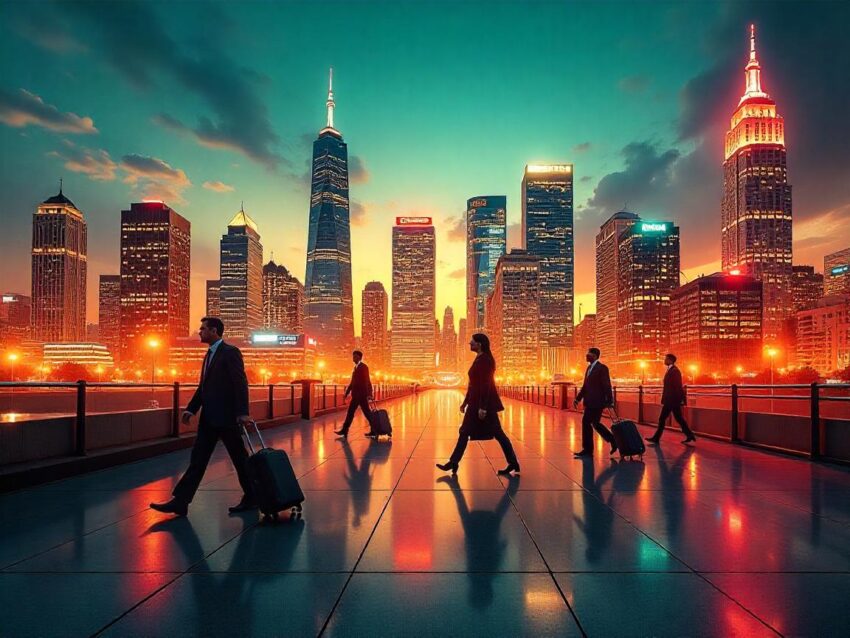- by foxnews
- 01 Jun 2025
New York City, Los Angeles, Chicago, San Francisco, Houston, Dallas, Atlanta Expecting a Major Come Back in Business Travel, But US Faces A Steep Twenty Two Percent Drop, The Must-Read Breakdown
New York City, Los Angeles, Chicago, San Francisco, Houston, Dallas, and Atlanta are all expecting a major comeback in business travel. These powerhouse cities—New York City, Los Angeles, Chicago, San Francisco, Houston, Dallas, and Atlanta—have long been the beating heart of corporate America. From towering boardrooms in New York City to high-tech hubs in San Francisco, and from oil giants in Houston to booming startups in Atlanta, each city is expecting a major rebound. However, despite the optimism in New York City, Los Angeles, Chicago, San Francisco, Houston, Dallas, and Atlanta, the US is facing a steep twenty-two percent drop in international business travel. That’s right—a steep twenty-two percent decline. This must-read breakdown reveals a critical contradiction. While New York City, Los Angeles, Chicago, San Francisco, Houston, Dallas, and Atlanta are pushing hard for recovery, the country as a whole is heading in the opposite direction.
- by travelandtourworld
- 17 May 2025
- in travel

Meanwhile, travelers are hesitant. The steep twenty-two percent drop reflects hesitation, frustration, and fear. And even as New York City, Los Angeles, Chicago, San Francisco, Houston, Dallas, and Atlanta pour resources into their business travel sectors, the decline keeps accelerating.
Looking ahead to summer, the picture darkens further. Cirium, an aviation analytics firm, reveals that advance bookings from Europe are down 12 percent for June through August compared to last year.
Behind every statistic lies a story. And in this case, those stories are deeply troubling. Visitors have been detained, interrogated, and deported at U.S. borders despite holding valid visas or green cards.
One German national with permanent U.S. residency reported a violent interrogation. A Lebanese doctor with a valid visa was denied entry after border agents reviewed her phone and deemed its contents suspicious. A Welsh tourist was held in a U.S. detention center for three weeks simply for entering at a border checkpoint.
These incidents are not isolated. They are shaping global perception of the U.S. as an increasingly hostile environment for even the most legitimate travelers.
After years of Zoom fatigue, professionals across industries are realizing what was nearly forgotten during the pandemic: nothing replaces face-to-face interaction. While virtual meetings are here to stay, in-person conferences have made a strong comeback. From Fortune 500 boardrooms to tech startup gatherings, companies are investing again in flying teams out to meet partners, build trust, and close deals.
Technology continues to play a dual role in the MICE industry: as both enabler and disruptor. Hybrid events are now the norm. Conferences no longer cater only to those in the room but also to global participants watching from across time zones.
AI-powered scheduling, VR networking spaces, real-time translation tools, and immersive stage designs are transforming the attendee experience. Yet, even as tech innovations grow, event organizers are doubling down on authenticity and storytelling. Experiences that feel personal, inclusive, and memorable stand out in a crowded digital landscape.
Moreover, data is king. Organizers are using analytics to refine agendas, track engagement, and deliver post-event value. From QR-coded booths at trade shows to app-integrated panel discussions, the smartest events are learning from every click, question, and conversation.
Sustainability in meetings and events has shifted from optional to expected. Carbon offsetting, zero-waste catering, digital swag, and green-certified venues are top of mind for planners and attendees alike.
Major cities are once again buzzing with event activity. Las Vegas, Orlando, Chicago, and San Diego remain dominant players, thanks to their infrastructure and weather advantages. Meanwhile, cities like Nashville, Austin, and Denver are rising as hot spots for their unique blend of innovation, culture, and approachability.
New York and San Francisco, though still recovering from steep declines during the pandemic, are slowly regaining their footing by focusing on premium, niche events and boutique conferences. Their international connectivity and global relevance keep them in the running.
Security and health concerns also linger. While COVID-19 no longer dominates headlines, public health policies still influence attendance, especially for international events. Event planners must now consider contactless check-ins, on-site health resources, and flexible refund policies as standard practice.
From meditation lounges to mental health breakouts, wellness has taken center stage. Event schedules now build in downtime. Meals feature local, sustainable ingredients. Outdoor sessions and team-building activities focus on bonding over business cards.
As 2025 unfolds, the meetings, conferences, and events industry in the U.S. is on solid, if cautious, ground. The pandemic redefined what matters. It forced organizers, companies, and travelers to slow down, reevaluate, and rebuild with intention.
Now, events are more focused, more personal, and more impactful. Business travel has a new purpose: not just to meet, but to connect, collaborate, and create shared value.
The World Travel & Tourism Council (WTTC) forecasts that the U.S. could lose up to $12.5 billion in international travel spending in 2025. That figure represents a staggering 22.5 percent drop from its 2019 peak.
When travel gets harder, business gets slower.
And when global entrepreneurs begin skipping U.S. events, or choosing to launch projects elsewhere, the long-term economic cost will far surpass short-term ticket losses.
While most countries are rolling out welcome campaigns and easing visa rules to attract global visitors, the U.S. is tightening its grip. Travel restrictions, political rhetoric, and border policies are telling a different story.
Once a symbol of freedom and opportunity, the U.S. is increasingly viewed abroad as unpredictable, inaccessible, and uninviting.
Because in business, as in travel, reputation is everything.
- by foxnews
- descember 09, 2016
Beach days benefit mental health and well-being as visits provide 'sea therapy'
Discover the benefits of sea therapy as experts highlight how beach visits can boost mental well-being, reduce stress and improve sleep through mindfulness and relaxation.
read more




